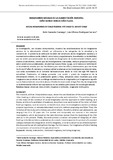Imaginarios sociales de la alimentación infantil: niño gordo versus niño flaco

Visualizar/
Data
2021-07-28Palabras Clave
obesidad, desnutrición, imaginario instituido, imaginario instituyenteobesity, malnutrition, instituted imaginary, instituting imaginary
Metadatos
Mostrar registro completoResumo
La investigación, con alcance interpretativo, muestra las consideraciones de los imaginarios sociales de la alimentación infantil, en referencia a las categorías de la obesidad y la desnutrición. El problema se enfoca en la visión del constructo de los imaginarios sociales y el acercamiento a alimentación infantil, como tema, y seguidamente, la exaltación de la debilidad, por no existir una construcción de la noción de imaginarios de la alimentación infantil, como evento a transformar, siendo que las investigaciones planteadas, siempre proponen hipótesis, sobre constructos ya elaborados, sin plantear nuevos Eidos. Luego, se introduce en la limitación de la unidad de estudio, que son los infantes, por tanto los niños y adolescentes, que van desde los 0 a los 17 años. El contexto y la temporalidad se abarcan en las investigaciones seleccionadas, que están sustentadas en el contexto latinoamericano desde el inicio del siglo XXI hasta la actualidad. Finalmente, el trabajo presenta, una noción y praxis de imaginarios de la alimentación infantil, en la polarización gordo y flaco; arrojando como resultado que, esos imaginarios son producto de un diálogo constante entre la imaginación y el imaginario o aquello que se llama el acto de creer de la doxa y el hecho de crear desde el logo. Por ello, los imaginarios de la alimentación infantil son expresiones de sociedades particulares del mundo glocalizado.
Información Adicional
| Otros Títulos | Social imaginaries of child feeding: fat child vs. Skinny child |
| Correo Electrónico | nolispediatra@hotmail.com alfonsorodriguez80@gmail.com |
| ISSN | 2244-7482 |
| Resumen en otro Idioma | The research, with an interpretative scope, shows the considerations of the social imaginary of infant feeding, in reference to the categories of obesity and malnutrition. The problem focuses on the vision of the construct of social imaginaries and the approach to infant feeding, as a theme, and then the exaltation of weakness, since there is no construction of the notion of infant feeding imaginary, such as event to be transformed, since the investigations carried out always propose hypotheses, on already elaborated constructs, without proposing new Eidos. Then, the limitation of the study unit is introduced, which infants, therefore children and adolescents, are ranging from 0 to 17 years old. The context and temporality are covered in the selected investigations, which are based on the Latin American context from the beginning of the 21st century to the present. Finally, the work presents a notion and praxis of imaginary of infant feeding, in the fat and skinny polarization; As a result, these images are the product of a constant dialogue between the imagination and the imaginary, or what is called the act of believing from the doxa and the act of creating from the logo. For this reason, the imaginaries of infant feeding are expressions of societies of the glocalized world. |
| Colación | 54-72 |
| Periodicidad | semestral |
| País | Venezuela |
| Institución | Universidad de Los Andes |
| Publicación Electrónica | Revista de Bioética Latinoamericana |
| Sección | Revista de Bioética Latinoamericana: Artículos |





